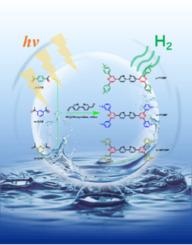Chinese Chemical Letters ( IF 9.4 ) Pub Date : 2022-04-20 , DOI: 10.1016/j.cclet.2022.04.038 Zhonghua Cheng 1 , Yan He 1 , Chen Yang 1 , Nan Meng 1 , Yaozu Liao 1

|
Conjugated microporous polymers (CMPs) with tunable bandgaps have attracted increasing attention for photocatalytic hydrogen evolution. However, the synthesis of CMPs usually needs expensive metal-based catalysts. Herein, we report a metal-free synthetic route to fabricate pyridyl conjugated microporous polymers (PCMPs) via a condensed polymerization between aldehyde and aryl ketone monomers. The PCMPs show widely tunable specific surface areas (347–418 m2/g), which were controlled via changing the used monomers. The PCMPs synthesized using monomers of dialdehyde and diacetylbenzene (diacetylpyridine) in the presence of pyridine exhibited the highest visible-light driven hydrogen evolution rate (9.56 µmol/h). These novel designed PCMPs provide wide adaptability to current materials designed for high-performance photocatalysts in different applications.
中文翻译:

带隙可调的吡啶基共轭微孔聚合物的无金属合成,用于有效的可见光驱动析氢
带隙可调的共轭微孔聚合物 (CMP) 在光催化析氢方面引起了越来越多的关注。然而,CMP 的合成通常需要昂贵的金属基催化剂。在此,我们报告了一种无金属合成路线,通过醛和芳基酮单体之间的缩聚来制造吡啶基共轭微孔聚合物 (PCMP) 。PCMP 显示出可广泛调节的比表面积 (347–418 m 2 /g),这是通过以下方式控制的改变使用的单体。在吡啶存在下使用二醛和二乙酰苯(二乙酰吡啶)单体合成的 PCMP 表现出最高的可见光驱动的析氢速率(9.56 µmol/h)。这些新颖设计的 PCMP 为当前为不同应用中的高性能光催化剂设计的材料提供了广泛的适应性。


















































 京公网安备 11010802027423号
京公网安备 11010802027423号